英语16种时态及练习题附答案
英语16种时态及练习题附答案
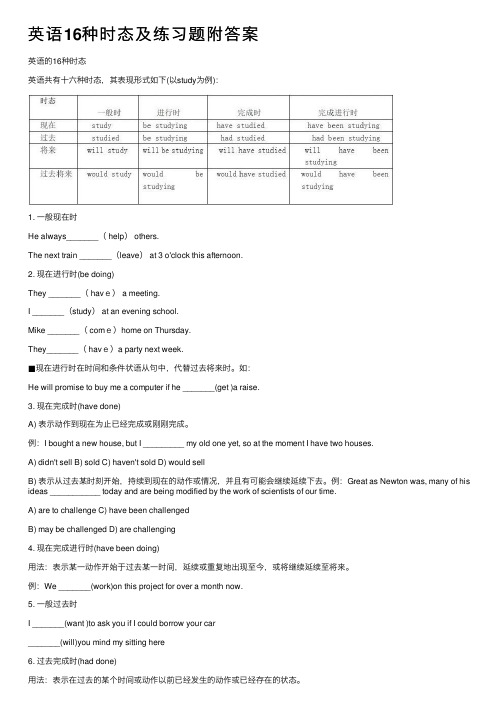
英语16种时态及练习题附答案英语的16种时态英语共有⼗六种时态,其表现形式如下(以study为例):1. ⼀般现在时He always_______( help) others.The next train _______(leave) at 3 o'clock this afternoon.2. 现在进⾏时(be doing)They _______( have) a meeting.I _______(study) at an evening school.Mike _______( come)home on Thursday.They_______( have)a party next week.■现在进⾏时在时间和条件状语从句中,代替过去将来时。
如:He will promise to buy me a computer if he _______(get )a raise.3. 现在完成时(have done)A) 表⽰动作到现在为⽌已经完成或刚刚完成。
例:I bought a new house, but I _________ my old one yet, so at the moment I have two houses.A) didn't sell B) sold C) haven't sold D) would sellB) 表⽰从过去某时刻开始,持续到现在的动作或情况,并且有可能会继续延续下去。
例:Great as Newton was, many of his ideas ___________ today and are being modified by the work of scientists of our time.A) are to challenge C) have been challengedB) may be challenged D) are challenging4. 现在完成进⾏时(have been doing)⽤法:表⽰某⼀动作开始于过去某⼀时间,延续或重复地出现⾄今,或将继续延续⾄将来。
高中英语时态语态练习题(附答案)
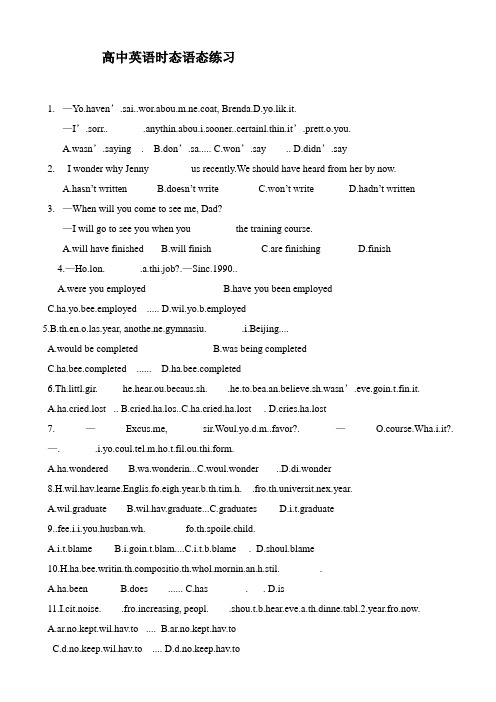
高中英语时态语态练习1.—Yo.haven’.sai..wor.abou.m.ne.coat, Brenda.D.yo.lik.it.—I’.sorr.._______.anythin.abou.i.sooner..certainl.thin.it’.prett.o.you.A.wasn’.saying.B.don’.sa.....C.won’.say ..D.didn’.say2.I wonder why Jenny ________us recently.We should have heard from her by now.A.hasn’t writtenB.doesn’t writeC.won’t writeD.hadn’t written3.—When will you come to see me, Dad?—I will go to see you when you ________ the training course.A.will have finishedB.will finishC.are finishingD.finish4.—Ho.lon._______.a.thi.job?.—Sinc.1990..A.were you employedB.have you been employedC.ha.yo.bee.employed .....D.wil.yo.b.employeds.year, anothe.ne.gymnasiu._______.i.Beijing....A.would be completedB.was being completedpleted ......pleted6.Th.littl.gir._____he.hear.ou.becaus.sh.____.he.to.bea.an.believe.sh.wasn’.eve.goin.t.fin.it.A.ha.cried.lost ..B.cried.ha.los..C.ha.cried.ha.lost .D.cries.ha.lost7.—Excus.me, sir.Woul.yo.d.m..favor?. —O.course.Wha.i.it?. —._______.i.yo.coul.tel.m.ho.t.fil.ou.thi.form.A.ha.wonderedB.wa.wonderin...C.woul.wonder ..D.di.wonder8.H.wil.hav.learne.Englis.fo.eigh.year.b.th.tim.h.__.fro.th.universit.nex.year.A.wil.graduateB.wil.hav.graduate...C.graduatesD.i.t.graduate9..fee.i.i.you.husban.wh.________fo.th.spoile.child.A.i.t.blameB.i.goin.t.blam....C.i.t.b.blame .D.shoul.blamepositio.th.whol.mornin.an.h.stil.________.A.ha.beenB.does......C.has . .D.is11.I.cit.noise.____.fro.increasing, peopl.____.shou.t.b.hear.eve.a.th.dinne.tabl.2.year.fro.now.A.ar.no.kept.wil.hav.to ....B.ar.no.kept.hav.toC.d.no.keep.wil.hav.to ....D.d.no.keep.hav.to12.Th.pric.________, bu..doub.whethe.i.wil.remai.so.A.wen.downB.wil.g.dow....C.ha.gon.downD.wa.goin.down13.—Ho.lon._______.eac.othe.befor.the._______.married?—Fo.abou..year....A.hav.the.known.ge..B.di.the.know.ge...A.C.d.the.know.ar.goin.t.get. D.ha...the.known.got14.Yo.can’.mov.i.righ.now.Th.hous.________.A.ha.paintedB.i.painte......C.i.bein.paintedD.i.painting15.—Hey,loo.wher.yo.ar.going!—Oh,I’.terribl.sorry.________.A.I’.no.noticing ..B..wasn’.noticin..C..haven’.noticedD..don’.notice16.Th.reporte.sai.tha.th.UF._______.eas.t.wes.whe.h.sa.it.A.wa.traveling ...B.travele....C.ha.bee.travelingD.wa.t.travel17.—I.thi.raincoa.yours?—No,min._______.ther.behin.th.door.A.i.hanging .......B.ha.hang.....C.hangs .....D.hang18..turne.aroun.an.sa.everybod.__.a..ma.wh.___nguage....was staring; was shouting B.was staring; shoutingC.staring; shoutingD.stared; shouted19.Henry remained silent for a moment.He ________.A.thoughtB.had thoughtC.was thinkingD.was thought20.We would like to go and thank him ourselves, but we ________ out his address yet,A.haven’t foundB.hadn’t foundC.didn’t findD.don’t find21.Shirley _____a book about China last year but I don’t know whether she has finished.A.has writtenB.wroteC.had writtenD.was writing22.—Have you got your test result?—Not yet.The papers ________.A.are not correctingB.have not correctedC.are still being correctedD.have already been corrected23.See the clouds! It ________ rain!A.willB.is going toC.mustD.certainly24.Do I have to take this medicine? It ________ so terrible.A.tastesB.is tastingC.is tastedD.has tasted25.Don’t take the magazine away.It ________ me.A.is belonged toB.belongs toC.was belonged toD.is belonging to26.Is this the third time that you ________ late?A.have beenB.amC.wasD.had been27.—Do you know when Tom ________ from abroad?—Perhaps it will be a long time before he ________.A.will come; will comees; will comeC.will come; comeses; comes28.My uncle said that he would telephone but I ________ from him so far.A.didn’t hearB.hadn’t heardC.haven’t heardD.won’t hear29.The telephone _____ four times in the last hour, and each time it ____ for my roommate.A.has rung; wasB.has been ringing; isC.had rung; wasD.rang; has been30.A storm ________ by a calm.A.is often being followedB.was often followedC.is often followedD.has often been followed31.The pen I ________ I ________ is on my desk, right under my nose.A.think; lostB.thought; had lostC.think; had lostD.thought; lost32.—We could have walked to the station.It was so near.—Yes, a taxi ________ at all necessary.A.wasn’tB.hadn’t beenC.couldn’t beD.won’t be33.A friend of mine returned to his house after a holiday only to find it ________.A.to be brokenB.had broken intoC.was brokenD.had been broken into34.They believed that by using computers the production of their factory ________.A.will greatly increaseB.would greatly increaseC.would be increased greatlyD.will have been greatly increased35.His eyes shone brightly when he finally received the magazines he ________.A.had long been expectedB.had long expectedC.ha.lon.expecte...D.wa.lon.expected36.—D.yo.lik.th.ne.pen?—Yes,i._______.ver.well...A.is writtenB.is writingC.writesD.wrote37.—Oh, it’s you? I didn’t recognize you.—I ________ my hair cut, and I ________ new glass.A.had; was wearingB.have had; am wearingC.had; woreD.have had; wear38.As she ________ the newspaper, Granny ________ asleep.A.read; was fallingB.was reading; fellC.was reading; was fallingD.read; fell39.However hard you ________, you will never succeed in pleasing her.A.tryB.will tryC.should tryD.would try40.—Can I help you, sir?—Yes, I bought this radio yesterday, but it ________.A.didn’t workB.won’t workC.can’t workD.doesn’t work41.—How are you today?—Oh, I ________ as ill as I do now for a very long time.A.didn’t feelB.wasn’t feelingC.don’t feelD.haven’t felt42.When Jack arrived he learned Mary ________ for about an hour.A.had goneB.had set offC.had leftD.had been away43.By this time tomorrow we ________ the machine.A.have repairedB.shall have repairedC.will repairD.would repair44.I don’t think Jim saw me, he ________ into space.A.just staredB.was just staringC.has just staredD.had just stared45.Helen ____ her key in the office so she had to wait until her husband ________ home.A.had left; cameB.has left; comesC.left; had comeD.had left; would come46.—You have left the light on.—Oh, so I have.________ and turn it off.A.I’ll goB.I’ve goneC.I goD.I’m going47.This is Ted’s photo.We miss him a lot.He ____ trying to save a child in earthquake.A.killedB.is killedC.was killedD.was killing48.The notice ________ “No smoking.”A.is wroteB.readsC.writesD.is read49.Good care must ________ babies particularly while they are ill.A.takeB.take ofC.be takenD.be taken of50.Shortly after we ________, a waiter came over to our table with a smile.A.seatedB.were seatedC.sat ourselvesD.had seated51.—You look pale, what troubled you?—I ________ my dead friend.A.am thinking aboutB.was thinking aboutC.had thought aboutD.will think about52.John and I _______ friends for eight years.We first got to know each other at a Christmas party.But we ________ each other a couple of times before that.A.had been; have seenB.have been; have seenC.have been; had seenD.had been; had seen53.Do make sure that you ________ a seat today!A.gotB.getC.shouldD.have get54.We ________ at the house as we ________ of buying it.A.looked; were thinkingB.were looking; were thinkingC.were looking; thoughtD.looked; had thought55.—I’m told that you are leaving for Beijing.—Who ________ so?A.saidB.had saidC.saysD.has said56.I ________ the room to be empty but found it occupied.A.had thoughtB.have thoughtC.didn’t thinkD.was thinking57.Selecting a mobile phone for personal use is no easy task because technology ___ so rapidly.A.will have changedB.has changedC.is changingD.will change58.I ________ ping-pong quite well, but I haven’t had time to play since the new year.A.will playB.have playedC.playedD.play59.Visitors ________ not to touch the exhibits.A.will requestB.are requestedC.are requestingD.request60.They ________ a snowstorm on their way home.A.caught inB.had caughtC.were caughtD.were caught in61.---Hey.loo.wher.yo.ar.goin.!---Oh.I’.terribl.sorry,____..I’.no.noticin...wasn’.noticing..haven’.notice...don’.notice.62.--Than.goodness.yo.ar.here.Wha.____.you?--Traffi.jam..keep..i.keeping.ha.kep..kept. 63.Th.hero’.stor.____differentl.i.th.newspapers..wa.reported..wa.reporting.report..reported64.Sarah.hurr.up..a.afrai.yo.ca.no.hav.tim.t.____.befor.th.party..ge.changed..ge.chang..ge.changin..ge.t.change65.Accordin.t.th.ar.dealer.th.paintin.____lio.dollars.A is expectedB expectsC expectedD is expecting1~5 DADBD 6~10 BBCAD11~15 ACDCB 16~20 AAACA21~25 DCBAB 26~30 ACCAC31~35 BADCC 36~40 CBBAD41~45 DDBBA 46~50 ACBDB51~55 BCBBC 5 6~60 ACDBD61-65 bdaaa。
初中英语时态练习题+附答案解析

初中英语时态练习题+附答案解析1.The boy is happy because he has sold out all the newspapers.2.The plan was given up because of the rain.3.We will not go climbing the hills if it XXX.4.Where have you been these days?5.Where is Tom。
He went to the post office。
He will be back soon.6.Mike says he wants to be a worker after he XXX.7.The last bus had just left when they got to the bus。
8.She won't go to bed until she finishes her work.9.XXX.10.I felt much better after I took the medicine.Note: There XXX.11."Where shall XXX?" "Let'XXX."12.I am afraid Mr Johnson will not visit our school tomorrow.13.I have lost my bike。
Have you seen it anywhere?14.Is this kind of car produced in Shanghai?15.We have seen several members of the family since we arrived.16XXX.17.The shop closes at this time of day.18.Where did you lose your watch?19.XXX last night?20.The nurse took good care of three children.21.Some children were taken good care of by the nurse.22.XXX.23.What language is XXX?24.The color TV was bought in that shop three days ago.25.He said he would stay here for another two days.26.The doctor said Jim must be operated on at once.27."Has the bridge been repaired yet?" "Yes。
英语16种时态及练习题附答案
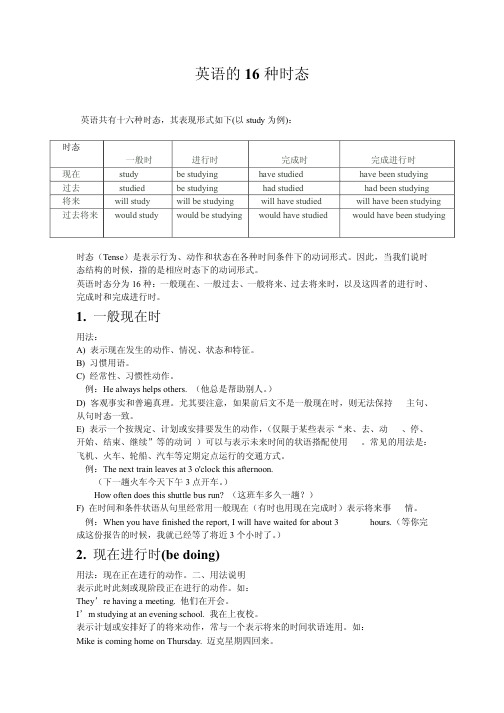
gniod
.gnihtemos er a yehT/uoY/eW .gnik row si tI/ehS/eH .gnivird m a I 式 定 肯
数复词名及 以数复称人三第 和称人二、一第 语 主
�如。气语等烦厌、扬赞示表用连等 reverof ,netfo ,syawla 与时行进在现 。始开半点七会乐音 .03 :7 ta strats trecnoc ehT )„t’nod I 说宜不(。去出备准不我晚今 .gnineve siht tuo gniog ton m’I �较 比试。时在现般一用宜�语主作物事�时行进在现用宜语主作人�事的做要将排安示表�注 。会晚个一开将们他期星下 .keew txen ytrap a gniv ah er’yehT
deiduts evah dluow deiduts evah lliw deiduts dah
gniyduts eb dluow gniyduts eb lliw gniyduts eb gniyduts eb 时行进
yduts dluow yduts lliw deiduts yduts
来将去过 来将 去过 在现 态时
� 。了时小个 3 近将了等经已就我�候时的告报份这成 完你等� .sruoh 3 tuoba rof detiaw evah lliw I ,troper eht dehsinif evah uoy nehW�例 。情 事来将示表�时成完在现用也时有�在现般一用常经里句从语状件条和间时在 )F ��趟一久多车班这� ?nur sub elttuhs siht seod netfo woH � 。车开点 3 午下天今车火趟一下� .noonretfa siht kcolc'o 3 ta sevael niart txen ehT�例 。式方通交的行运点定期定等车汽、船轮、车火、机飞 �是法用的见常。 用使配搭语状的间时来未示表与以可� 词动的等”续继、束结、始开 、停、 动、去、来“示表些某于限仅� �作动的生发要排安或划计、定规按个一示表 )E 。致一态时句从 、句主 持保法无则�时在现般一是不文后前果如�意注要其尤。理真遍普和实事观客 )D � 。人别助帮是总他� .srehto spleh syawla eH�例 。作动性惯习、性常经 )C 。语用惯习 )B 。征特和态状、况情、作动的生发在现示表 )A �法用
初中英语动词的时态和语态专项练习50题(附答案解析)
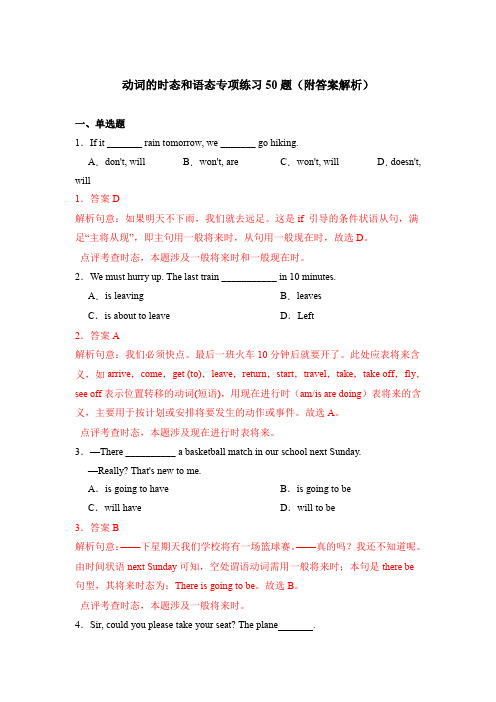
动词的时态和语态专项练习50题(附答案解析)一、单选题1.If it _______ rain tomorrow, we _______ go hiking.A.don't, will B.won't, are C.won't, will D.doesn't, will1.答案D解析句意:如果明天不下雨,我们就去远足。
这是if 引导的条件状语从句,满足“主将从现”,即主句用一般将来时,从句用一般现在时,故选D。
点评考查时态,本题涉及一般将来时和一般现在时。
2.We must hurry up. The last train ___________ in 10 minutes.A.is leaving B.leavesC.is about to leave D.Left2.答案A解析句意:我们必须快点。
最后一班火车10分钟后就要开了。
此处应表将来含义,如arrive,come,get (to),leave,return,start,travel,take,take off,fly,see off表示位置转移的动词(),用现在进行时(am/is are doing)表将来的含义,主要用于按计划或安排将要发生的动作或事件。
故选A。
点评考查时态,本题涉及现在进行时表将来。
3.—There __________ a basketball match in our school next Sunday.—Really? That's new to me.A.is going to have B.is going to beC.will have D.will to be3.答案B解析句意:——下星期天我们学校将有一场篮球赛。
——真的吗?我还不知道呢。
由时间状语next Sunday可知,空处谓语动词需用一般将来时;本句是there be句型,其将来时态为:There is going to be。
英语时态语态练习(含详解答案)

英语时态语态练习题(附答案)stepped into the office,_____down and began to fill in the forms.sit itsaid she would telephone but we _____from her so far.’t heard’t hear ’t heard ’t hearI got to the cinema,thefilm____for ten minutes.begun begun been on’ll go with you as soon as I____my homework./ finish finishingit_____tomorrow,Iwon’t go to the cinema./ rain rainingis going to be a nurse when she_____up./ going to grow 下列四句是“这本书我已经买了三个月了。
”的英译文,哪一种不对/ have had this book for three months./ have bought this book for three months./ bought this book three months is three months since I bought this book.8.——Come in,Peter,I want to show you something.——Oh,how nice of you!I_____you_____to bring me a gift./;are going ;were going/’tthink;were going ’tthought;were goingI was at college I_____three foreign languages,butI_____all except for a few words of each./;had forgotten ;;had forgotten ;have forgottenpolice found that the house_____and a lot of things____./ broken into;has been stolen broken into;had been been broken into; been broken into;stolenvolleyball macth will be put off if it____./ rain rainingdress when she cut her finger./ making makingwhen Miss Brown went to get a book she_____in the office./;;has left ;had left ;had left14.——Have you moved into the new house——No yet,the rooms_____,/ being painted painted being painting15.——We haven’t heard from Jane for a long time.——What do you suppose____to her/ happening happen happened happened16.——Do you know our town at all——No,this is the first time I _____here./ been coming17.——We could have walked ot the was so near.——Yes,Ataxi_____at all necessary./’’t been ’t be ’t becity noises_____fromincreasing,people_____shout to be heard even at the dinner table 20 years from now./ not kept;will have to not kept;have not keep;will have to not keep;have tothe house when no one_____./;was looking ;;had looked ;lookedlast time I_____Janeshe____cotton in the fields./;was picking ;;;was pickingwere all surprised when he made it clear that he_____office soon./ leave leftsome parts of the world,tea_____with milk and sugar./ serving served pen I____I ____is on my desk,right under my nose./;;had lost ;had lost ;have lost24.——How long____each other before they____married——For about a year./ they known; they know;were going to they know;are going to get they known;gothave looked for it everywhere but still____it./;don’t find missing;don’;haven’t found missing;haven’t found26.——Can I join the club,Dad——You can when you____a bit older./ get getting have got27.——I’m sorry to keep you waiting.——Oh,not at only a few minutes./ been been be28.——Do you like the material——Yes,it_____very soft./ feeling feltdon’t really work the new secretary arrives./ help out just helped outjust helping out completedneed one more stamp before my collection_____./ completed been completed completed31.——Your phone number againI____quite catch it.——It’s 9568442./’’’’t32.——_____the sports meet might be put off.——Yes,it all depends on the weather./’ve been told ’ve told ’m told told,Granny____asleep./;was falling ;;was falling ;felldon’t need to describe her,I____hersevral times./ met met don’t think Jim saw me;he____into space./ stared staring just stared just stared36.——____my glasses——____Yes,I saw them on your bed a minute ago./ you see you seen you see you seenkeys in the office so she had to wait until her husband____home./;;had come ;;would comefirst met Lisa three years ____at a radio shop at the time./ worked working been working worked39.——Who is Jerry Cooper——_____I saw you shaking hands with him at the meeting./’t you meet him yet ’t you meet him 't’ you meet him yet ’t you met him yet40.——Alice,why didn’t you come yesterday——I____,but I had an unexpected visitor./ going toChinese Communist Partty_____in Shanghai in 1921./ found foundedmy home town since liberation./ been taken place taken place taken placewater will be further polluted unless some measures_____./ be taken taken taken been taken’ll be an astronaut by the time he_____thirty./ been be going to beon his face suggested that he____that./;hadn’t expected ;hadn’;would expect ;shouldn’t expect【试题解析】1.选C。
英语动词时态与语态试题答案及解析

英语动词时态与语态试题答案及解析1.— Can I borrow your tape-recorder?—No. The last time you borrowed it, you _______ it for a month.A.kept B.had kept C.are keeping D.have kept【答案】A【解析】此题考查一般过去时的用法。
语境:“—借一下你的录音机好吗?---不。
你上次借去一个月才还。
”此题较难虽然有for a month一段时间,但是语境指在过去用了一个月,故用一般过去时。
本对话取材于《英国口语词典》,语言真实、地道。
【考点】考查动词时态2. The telephone _____ three times in the last hour, and each time it _____ for my sister.A.had rung; was B.has rung; was C.rang; has been D.has been ringing; is【答案】B【解析】句意:在过去的一个小时里,电话响了三次,每次都是找我的姐姐的。
本题第一句的关键词是in the last hour,该时间状语通常和现在完成时连用;第二空描述的是过去所发生的事情,故使用一般过去时。
故B项正确。
【考点】考查时态3.(2014届北京市海淀区高三下学期期中练习)—Did you sleep well last night?— No, the loud noise from the street ______ me awake for hours.A.had kept B.is keeping C.has kept D.kept【答案】D【解析】句意:上文,昨晚你睡好没有?下文,没有。
街上的吵闹声让我醒了几个小时。
表示发生在过去的事情,故用一般过去时,选D。
4.(2014届山东省济宁市曲阜师大附中高三上学期期中考试)I have to see the doctor this afternoon because I ____ a lot lately.A.have beencoughingB.had coughed C.coughed D.cough【答案】A【解析】考查动词时态。
人教版英语英语动词的时态专项练习(附答案)含答案百度文库
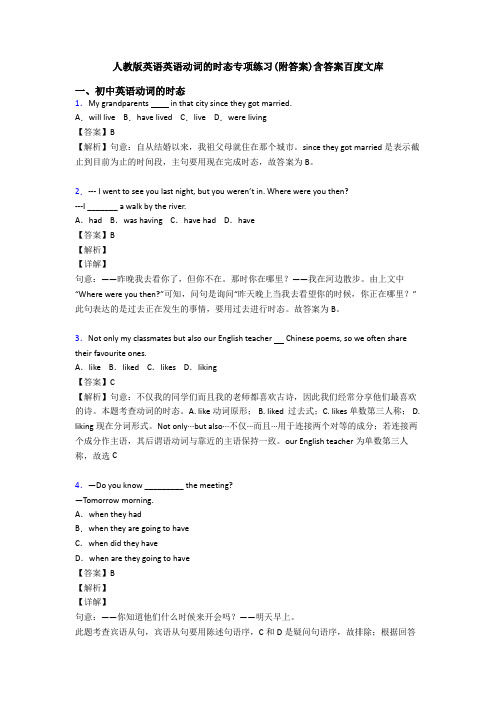
—Oh, I didn’t see it, either. I’m afraid you ___________ it.
A.are losingB.will loseC.have lostD.were losing
【答案】C
【解析】
句意:——妈妈,我的字典在哪里?——哦,我也没有看到它,恐怕你把它弄丢了。A. are losing现在进行时态;B. will lose一般将来时态;C. have lost现在完成时态;D. were losing过去进行时态。lose这一动词发生在过去,造成的结果是现在看不见了,属于完成的动作,要用现在完成时态来表达,故答案为C。
9.– Don’t worry! I’m sure your son will arrive safely.
-- But if he ______, what can I do? It’s getting dark and it’s going to rain.
2.--- I went to see you last night, but you weren’t in. Where were you then?
---I _______ a walk by the river.
A.had B.was having C.have had D.have
【答案】B
一Yes. Ithere many times.
A.went; have been B.have gone; went
C.went; have gone D.have been;went
【答案】A
【解析】句意:-桂林是个很棒的地方。我多年前去过那里。-是的。我去过那里很多次。many years ago很多年前,跟一般过去时态连用,所以谓语动词使用go的过去式went。下文表示过去的动作对现在造成的影响与结果,所以谓语动词使用现在完成时态,have/has+动词的过去分词,have/has been to.. ,意为“曾经去过某地”,有“去过某地”的经历; have/has gone to…,意为“去了某地”,人不在说话地点。本句表示“曾经去过某地”。故选:A。
- 1、下载文档前请自行甄别文档内容的完整性,平台不提供额外的编辑、内容补充、找答案等附加服务。
- 2、"仅部分预览"的文档,不可在线预览部分如存在完整性等问题,可反馈申请退款(可完整预览的文档不适用该条件!)。
- 3、如文档侵犯您的权益,请联系客服反馈,我们会尽快为您处理(人工客服工作时间:9:00-18:30)。
英语的16种时态英语共有十六种时态,其表现形式如下(以study为例):时态(Tense)是表示行为、动作和状态在各种时间条件下的动词形式。
因此,当我们说时态结构的时候,指的是相应时态下的动词形式。
英语时态分为16种:一般现在、一般过去、一般将来、过去将来时,以及这四者的进行时、完成时和完成进行时。
1. 一般现在时用法:A) 表示现在发生的动作、情况、状态和特征。
B) 习惯用语。
C) 经常性、习惯性动作。
例:He always helps others. (他总是帮助别人。
)D) 客观事实和普遍真理。
尤其要注意,如果前后文不是一般现在时,则无法保持主句、从句时态一致。
E) 表示一个按规定、计划或安排要发生的动作,(仅限于某些表示“来、去、动、停、开始、结束、继续”等的动词)可以与表示未来时间的状语搭配使用。
常见的用法是:飞机、火车、轮船、汽车等定期定点运行的交通方式。
例:The next train leaves at 3 o'clock this afternoon.(下一趟火车今天下午3点开车。
)How often does this shuttle bus run? (这班车多久一趟?)F) 在时间和条件状语从句里经常用一般现在(有时也用现在完成时)表示将来事情。
例:When you have finished the report, I will have waited for about 3 hours.(等你完成这份报告的时候,我就已经等了将近3个小时了。
)2. 现在进行时(be doing)用法:现在正在进行的动作。
二、用法说明表示此时此刻或现阶段正在进行的动作。
如:They’re having a meeting. 他们在开会。
I’m studying at an evening school. 我在上夜校。
表示计划或安排好了的将来动作,常与一个表示将来的时间状语连用。
如:Mike is coming home on Thursday. 迈克星期四回来。
They’re having a party next week. 下星期他们将开一个晚会。
注:表示安排将要做的事,人作主语宜用现在进行时,事物作主语,宜用一般现在时。
试比较:I’m not going out this evening. 今晚我不准备出去。
(不宜说I don’t…)The concert starts at 7: 30. 音乐会七点半开始。
现在进行时与always, often, forever等连用表示赞扬、厌烦等语气。
如:You’re always interrupting me! 你老打断我的话!(抱怨)My father is always losing his car keys. 我爸老丢车钥匙。
(不满)She’s always helping people. 她老是帮助别人。
(赞扬)■现在进行时在时间和条件状语从句中,代替过去将来时。
如:He promised to buy me a computer if he got a raise. (from )注意:Array像be,think,understand,love,have,own,see, hear, find, belong to 等静态动词通常不用于进行时。
三.现在进行时的肯定肯定句、否定句、疑问句形式:3. 现在完成时(have done)用法:A) 表示动作到现在为止已经完成或刚刚完成。
例:I bought a new house, but I _________ my old one yet, so at the moment I have two houses.A) didn't sell B) sold C) haven't sold D) would sell答案是C) haven't sold。
B) 表示从过去某时刻开始,持续到现在的动作或情况,并且有可能会继续延续下去。
此时经常用延续性动词。
时间状语常用since加一个过去的时间点,或for加一段时间,或by加一个现在时间。
例:Great as Newton was, many of his ideas ___________ today and are being modified by the work of scientists of our time.A) are to challenge C) have been challengedB) may be challenged D) are challenging全句的意思是:“虽然牛顿是个伟大的人物,但他的许多见解直到今天还在受到挑战,并且被现代科学家的工作所修正。
”challenge是及物动词,在本句中应当是被动语态;其动作延续到今天,所以要用现在完成时态。
可见答案是C) have been challenged。
A) are to challenge和D) are challenging都是主动语态,不可能是答案。
B) may be challenged虽然是被动语态,但意思与全句内容不合,所以不对。
C) 表示发生在过去,但对现在仍有影响的动作或情况。
通常用点动词,如:arrive, begin, find, give, lose等。
例:John has broken his left leg.(约翰摔断了左腿。
)注意事项A) 现在完成时是联系过去和现在的纽带。
现在完成时和过去时的区别在于:现在完成时强调动作的动态,或受动态的影响,是动态的结果,对现在有影响;过去时只表示过去的某个具体时间里发生的动作,与现在没有联系。
例:He worked in that hospital for 8 years.(他曾经在那家医院工作了8年。
这只是讲述一个过去的事实,他现在已经不在那家医院了。
)He has worked in that hospital for 8 years.(他已经在那家医院里工作了8年。
表示他从过去开始工作,一直工作到现在,现在仍在那家医院工作。
)B) 因为含有for加一段时间或since加一个时间点这样的时间状语的完成时,有动态和延续性的特点,所以不能使用终端动词或瞬间动词。
例:My sister has been married for 5 years.(过去分词做表语表示状态,可以延续)My sister has married. Don't disturb her.(终端动词)C) 在"this is the first/ second/ third……time that……"句型里要求用完成时。
例:This is the second time that the products of our company have been shown in the International Exhibition.(这是我公司产品第二次参加国际展览会。
)D) 句型"It is/ has been……since"所使用的两种时态都正确。
例:It is/ has been 10 years since I last saw him.(从我上次见到他以来已经10年了。
)E) 在"no sooner than"、"hardly/ scarcely ……when"、"before"、"prior to"等句型中,主句要求完成时。
例:I haven't met that professor prior to today.(以前我从未见过那位教授。
)4. 现在完成进行时(have been doing)用法:表示某一动作开始于过去某一时间,延续或重复地出现至今,或将继续延续至将来。
例:We have been working on this project for over a month now.(到目前为止,我们一直在处理那个项目,已经花了一个多月时间了。
)注意事项:与现在完成时相比,现在完成进行时更强调:在从过去到现在的时间里,动作或状态一直持续或一直反复出现。
例:1997年6月四级第45题It seems oil ___________ from this pipe for some time. We'll have to take the machine apart to put it right.A) had leaked B) is leakingC) leaked D) has been leaking从本题上下文看,这两个句子的意思是:“看来,这个管道漏油已有一段时间了,我们将不得不拆卸机器排除故障。
”第二句表示将要采取的措施。
第一句动作发生在第二句之前,并且延续到现在为止仍在继续。
因此,空格中需用现在完成时或现在完成进行时。
D) has been leaking是现在完成进行时,因此是本题的答案。
有11%的考生误选了B) is leaking。
由于本句有时间状语for some time,表示谓语动作延续,谓语不能用现在进行时,必须用和完成时有关的时态。
有些考生误选了C) leaked或A) had leaked。
是因为他们没有注意到本题第二句是一般将来时,所以第一句的谓语不能用过去时或过去完成时。
5. 一般过去时用法:A) 表示过去某个时间发生的动作或情况。
B) 表示过去习惯性动作。
特别是由would/ used to do表达的句型,本身表示的就是过去时。
例:The old man would sit on a bench in the quiet park and look at others for hours without doing anything or talking to anybody.(老人过去常常坐在宁静的公园里的一条长椅上,看着其他的人,一坐就是数个小时,什么也不干,也不和任何人交谈。
)He used to visit his mother once a week.(他以前总是每周看望一次他的母亲。
)C) 有时可代替一般现在时,表达一种婉转、客气、礼貌、商量的语气。
例:I wanted to ask you if I could borrow your car?(我想向您借车用一用,可以吗?)Would you mind my sitting here?(您介意我坐在这里吗?)注意事项:A) 注意时间状语的搭配。
一般过去时的时间状语应该是表示过去某个时间的词或词组,如:yesterday, last month, in 1999, two days ago等,绝对不可与recently, in the past 10 years, this month等连用,因为这样的时间状语都与现在有关系,应该用现在完成时或一般现在时。
